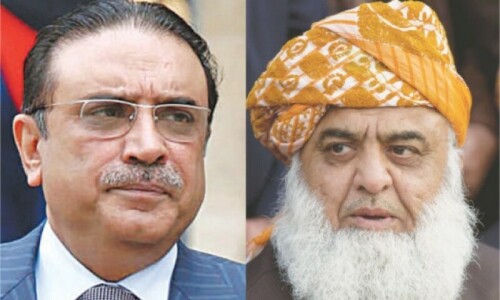 The world can be a better place to live when there is more than one super powers. Will the world economy not fair better when it has more than one global currency? And things get worse when a country that issues that world currency combines political dominance with military might and the economic sweep of that power becomes excessive. When the dollar slides, it creates problems for the global economy.
The world can be a better place to live when there is more than one super powers. Will the world economy not fair better when it has more than one global currency? And things get worse when a country that issues that world currency combines political dominance with military might and the economic sweep of that power becomes excessive. When the dollar slides, it creates problems for the global economy.
The world was hoping recently for a half a per cent cut in interest rates. Instead the US Fed came out with a quarter per cent cut. And as a result of falling dollar, the crude oil price soared to $100 a barrel in New York and culminated in the dollar falling further against the euro. The oil price has also gone up because of the fall in US strategic reserve and the sustained violence in the oil belt of Nigeria.
There are frantic quests for other options to develop an alternative to an unstable greenback. The options are stated to be many beginning with the old Gold reserve system but gold prices have been shooting up and hit the highest level of $ 865 an ounce. Those who have large gold stocks are lucky. But the gold price can come down in the manner it went up to its historic height. And gold doesn’t earn interest unlike the US treasury bonds.
Much of the dollar reserve of countries is not kept in the form of depreciating US currency as that will not earn any interest. Instead it is held in the form of US bonds which earn interest.
When central bank began building its foreign exchange reserve it initially began buying the dollar from the kerb market and the banks Later, the reserves swelled on the back of huge capital and financial inflows. Bulk of the reserves are still held in deprecating dollar and strengthening euro.
Most of China’s foreign exchange reserve is kept in dollars. The reserves of Hong Kong, Taipei and Japan held in dollars are being shifted to the euro.
A part of the American strategy is to let the dollar go down so that American goods become cheaper in the world market and the US exports can compete with relatively stronger yuan products of China .
The members of the Organisation of Petroleum Exporting countries are sour over the fall of the dollar and have been raising the dollar price of oil.
A Gulf Cooperation Council has decided to have a common currency for its members from the year 2010. When that currency comes into circulation, the Opec is likely to quote oil prices in that currency. The fact is while the dollar has gone down against the euro by 40 per cent, the oil price has gone up by 58 per cent. So the oil exporters are greater gainers.
It has been also suggested that the dollar should not be allowed to float downwards haplessly. The sinking of the dollar is due to the large US trade deficit ,its sustained budgetary deficit and its balance of payments deficit which is reduced partly by the dollar bond sale.
As the dollar has been going down, India re-valued its rupee to 39 a dollar but as the exports were hurt and there were the adverse repercussions, the rupee was allowed to 41-42 to a dollar.
The Pakistan rupee has come down to nearly Rs62 a dollar against the falling dollar. If the dollar had not fallen soon steadily, the dollar exchange rate could as well be Rs80. So there has been demand from trade and industry for a formal devaluation of the rupee instead of letting it float down. But further devaluation is unacceptable and since the process once starts, it becomes difficult to halt.
The real solution lies in curbing inflation, beginning with the high food inflation in which wheat is selling at a historic Rs21000 a tonne with its widespread ramifications.















































Dear visitor, the comments section is undergoing an overhaul and will return soon.